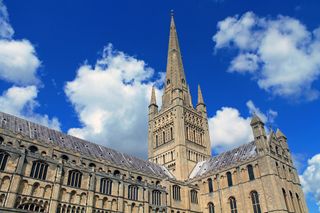Church and state are set to use spires to boost rural connectivity
The initiative will also offer local communities the chance to learn digital skills

The government and the Church of England have teamed up to enhance digital connections in rural areas by using church spires to boost network coverage.
The agreement has been put in place by the National Church Institutions (NCIs) of the Church of England, the Department for Digital, Culture, Media and Sport (DCMS) and the Department for the Environment, Food and Rural Affairs (Defra), who are collectively encouraging churches around the country to use their building structures as means of filling in those traditionally difficult to reach black spots.
Church spires will be used to mount telecoms infrastructure, boosting the signal for broadband, mobile and WiFi services.
"Churches are central features and valued assets for local communities up and down the country," DCMS Secretary of State, Matt Hancock said. "This agreement with the Church of England will mean that even a 15th century building can help make Britain fit for the future improving people's lives by boosting connectivity in some of our hardest-to-reach areas."
Other aspects of the scheme will involve the government offering local communities the support to develop digital skills in remote areas, helping those who wouldn't normally have access to a digital education the knowledge they need to connect their local area.
"It is vitally important people living in the countryside have the same opportunities as those in urban areas, and that means having strong mobile and broadband infrastructures in place," Rural Affairs Minister Lord Gardiner said. "This initiative marks an important step in our continued drive to connect better our rural communities and bridge the digital divide."
The government and Church of England have agreed that any equipment installation will not affect the character and architectural/historical importance of the church.
Get the ITPro. daily newsletter
Receive our latest news, industry updates, featured resources and more. Sign up today to receive our FREE report on AI cyber crime & security - newly updated for 2024.
"Mobile UK welcomes this announcement from Government and the Church of England, which emphasises the benefits of mobile connectivity to local communities," Hamish Macleod, Director Mobile UK, said. "Where there is a need, a suitable building is available and appropriate terms can be agreed, the mobile operators will continue to extend their use of churches to increase mobile coverage and capacity, while respecting the church environment."
Image: Shutterstock

Clare is the founder of Blue Cactus Digital, a digital marketing company that helps ethical and sustainability-focused businesses grow their customer base.
Prior to becoming a marketer, Clare was a journalist, working at a range of mobile device-focused outlets including Know Your Mobile before moving into freelance life.
As a freelance writer, she drew on her expertise in mobility to write features and guides for ITPro, as well as regularly writing news stories on a wide range of topics.




